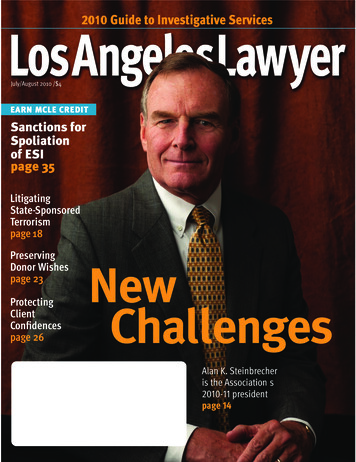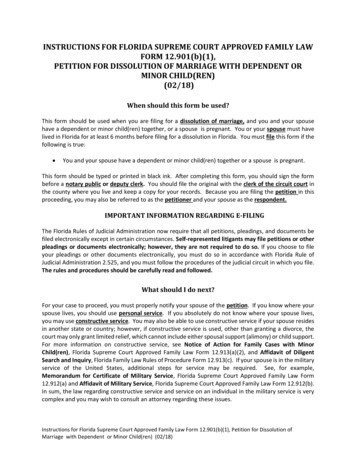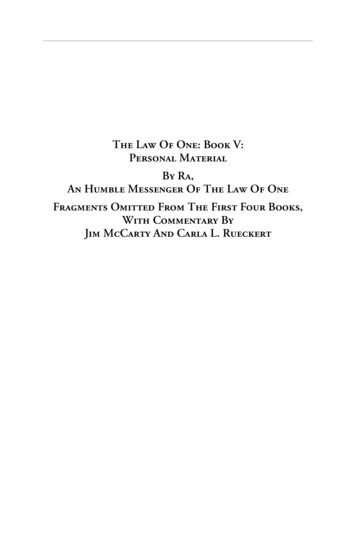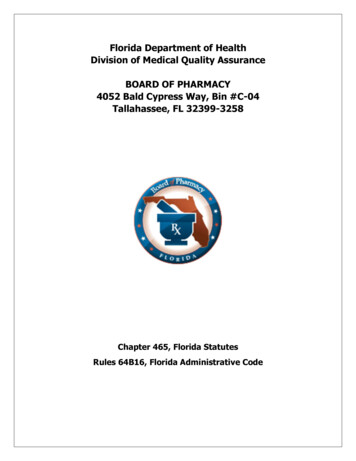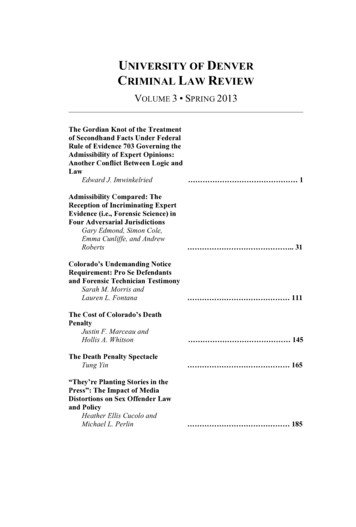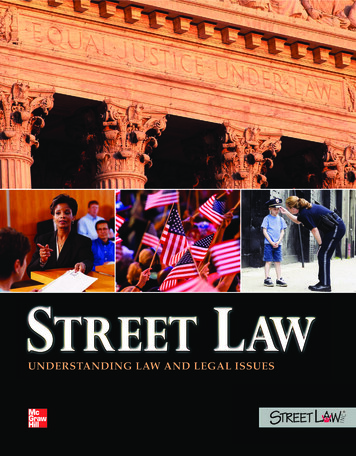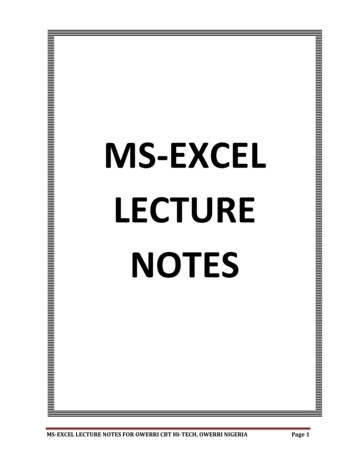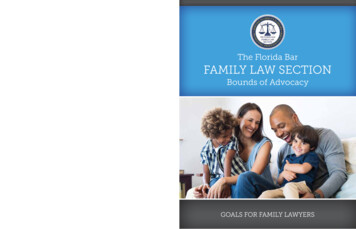
Transcription
The Florida BarFAMILY LAW SECTIONBounds of AdvocacyTHE FAMILY LAW SECTIONThe Florida Bar 651 E. Jefferson St. Tallahassee, Fl 32399850-561-5650 familylawfla.orgGOALS FOR FAMILY LAWYERS
BOUNDS OF ADVOCACYGoals for Family Lawyers in FloridaPrefaceThe original Bounds of Advocacy was published by the American Academy of MatrimonialLawyers (AAML) in 1991. It was revised in 2002. Also in 2002, a committee was formed bythe Family Law Section of The Florida Bar to adapt the Bounds to Florida law and practice.Because of that effort, the Bounds of Advocacy Goals for Family Lawyers in Florida wasoriginally published in 2004. A new committee was appointed by Nicole Goetz, chair of theFamily Law Section, to update the Bounds to capture changes in marital and family law,ethics and professionalism, and social media and technology since the original publication.The Family Law Section Ad Hoc Bounds of Advocacy Committee submits this 2018 revisionto The Florida Bar and the Family Law Section to be used as guidance in this important areaof practice.May 1, 2018Richard West, co-chair, OrlandoMelinda Gamot, co-chair, Palm Beach GardensHon. Scott Bernstein, MiamiDr. Deborah Day, Winter ParkMaria C. Gonzalez, Ft. LauderdaleKy Koch, ClearwaterDavid Manz, MarathonHon. Ray McNeal, OcalaAshley Myers, Jacksonville1
PRELIMINARY STATEMENTThe purpose of the Bounds is to guide Florida family lawyers through the quagmire ofprofessional and ethical dilemmas that are unique to the practice of family law. The intent isto suggest a higher level of practice than the minimum baseline of conduct required by theRules Regulating The Florida Bar. Many family lawyers encounter situations where the rulesprovide insufficient guidance.Since the original publication in 2004, there has been an ever-increasing emphasis on theimportance and requirement of greater professionalism in all areas of practice. The FloridaSupreme Court, with encouragement from The Florida Bar, concluded in 2013 that furtherintegrated, affirmative, practical, and active measures were needed. The court adoptedthe Standards of Professionalism, which collectively include (1) Oath of admission to TheFlorida Bar, (2) The Florida Bar Creed of Professionalism, (3) The Florida Bar ProfessionalismExpectations, (4) the Rules Regulating The Florida Bar, and (5) the decisions of the FloridaSupreme Court. See In re: Code for Resolving Professionalism Complaints, 116 So. 3d280 (Fla. 2013). “Members of The Florida Bar shall not engage in unprofessional conduct.‘Unprofessional conduct’ means substantial or repeated violations of” any of the aboveintegrated sources.Even with the further guidance of the Standards of Professionalism, there are still areas uniqueto family law. The breakup of a family, however “family” is defined, carries a ripple effect thatimpacts not only the couple, but children, other family members, and an array of third parties.Disputes occur in a volatile and emotional atmosphere. The family lawyer is tasked with thedelicate balancing act of protecting the client, looking out for the well-being of the children,advancing the case with the need for due diligence and cost-effective speed, scrupulouslyfollowing the rules of professional responsibility, and maintaining civility and courtesy to all.It is the goal of the Bounds to elevate professionalism in the practice of family law. It is ourresponsibility as family lawyers to ensure that concern for a client’s desired result does notsubvert our fairness, honesty, civility, respect, and courtesy throughout the process. We areproblem solvers. We must model appropriate behavior. We have a responsibility to assist inproviding pro bono public service as provided in the Rules Regulating The Florida Bar, 4-6.1and 4-6.2. We have an obligation to our profession and the people we represent to help solvedisputes with grace and dignity.2
TABLE OF CONTENTS1PROFESSIONAL COOPERATION AND THE ADMINISTRATION OF JUSTICE.71.1A lawyer must strive to lower the emotional level of family disputes by treatingeveryone with respect.81.2A lawyer must stipulate to undisputed facts.91.3A lawyer must not mislead anyone.91.4A lawyer must not misrepresent the authority to settle. 101.5A lawyer should correct inadvertent errors made by the other side that do not reflectthe agreement. 111.6A lawyer receiving materials that appear to be confidential must refrain from reviewingthe materials and must return them to the sender.121.7A lawyer may use materials received from any source unless the materials appear to beprivileged, confidential, or improperly obtained.131.8A lawyer must cooperate in the exchange of discovery.141.9A lawyer must not use discovery for delay, harassment, or obstruction. 161.10A lawyer must not ask irrelevant personal questions or questions designed toembarrass a witness.171.11A lawyer should grant reasonable extensions of time that will not adversely affect theclient’s legitimate interests.171.12A lawyer should cooperate in scheduling hearings and depositions.171.13A lawyer must provide notice as soon as possible of the need to cancel anyscheduled matter. 181.14A lawyer must transmit proposed orders, other than ex parte orders, to the other sidebefore submission to the court. A lawyer must promptly communicate approval orobjection to the proposed order. 181.15A lawyer must not seek an ex parte order except in exigent circumstances. 191.16A lawyer must deliver documents to the court and the other side at the same time. 193
1.17A lawyer must avoid disparaging personal remarks or acrimony toward the opposingparty, opposing counsel, third parties, or the court.201.18A lawyer must not inappropriately communicate with a party represented bya lawyer.202COMPETENCE AND ADVICE. 212.1A lawyer should advise the client of the emotional and economic impacts of alteringthe family structure, and explore all options including reconciliation.212.2A lawyer should advise the client of the potential effect of the client’s conduct indisputes involving children.212.3A lawyer must advise the client about alternative dispute resolution. 232.4A lawyer must not condone, assist, or encourage a client to transfer, hide, dissipate, ormove income or assets to improperly defeat another party’s claim. 242.5A lawyer should attempt to resolve family disputes by agreement and should considerall appropriate means of achieving resolution. 252.6A lawyer must competently handle all aspects of the representation. 252.7A lawyer should advise the client about the availability of “unbundled services.”.262.8A lawyer should endeavor to achieve the client’s lawful objectives as economically andexpeditiously as possible.262.9A lawyer must be familiar with ethical guidelines regarding social media, data, andelectronic communication. 272.10A lawyer should advise the client about the potential legal consequences ofintercepting and opening mail or electronic communications addressed to another.283CLIENT RELATIONSHIP AND DECISION-MAKING.303.1A lawyer should inform every client what the lawyer expects from the client and whatthe client can expect from the lawyer.313.2A lawyer must educate the client so the client can make informed decisions. 323.3A lawyer must keep the client informed of developments in the case.333.4A lawyer must respond promptly to all communications from the client.334
3.5A lawyer should share decision-making responsibility with the client, and counsel theclient about the propriety of the objectives sought and the means employed to achievethem.343.6A lawyer should protect the client when the client’s decision-making ability appears tobe impaired.363.7The lawyer should not permit relatives or other third persons to interfere withrepresentation or affect the lawyer’s independent professional judgment. 373.8A lawyer should not allow personal, moral, or religious beliefs to diminish loyalty tothe client or usurp the client’s right to make decisions concerning the objectives ofrepresentation.383.9A lawyer should discourage the client from interfering in the other party’s effort toobtain counsel of choice.383.10A lawyer should not communicate with the media about a family law case except toprotect the client’s legitimate interests and with the client’s consent.394CONFLICT OF INTEREST. 414.1A lawyer must not represent both parties in a family law matter, even if the parties donot wish to obtain independent representation.4142A lawyer should not offer legal advice to an unrepresented opposing party. 424.3A lawyer should not simultaneously represent both a client and the person with whomthe client is romantically involved.434.4A lawyer should not have a romantic relationship with a client, opposing counsel, or ajudicial officer assigned to the case during the time of the representation.435FEES.445.1Fee agreements should be in writing and clearly stated.455.2Fee agreements should clearly define the scope of the representation.455.3A lawyer should provide clear, concise and periodic statements of fees and costs. 475.4All transactions that provide security for payment of attorney’s fees should bein writing. 475.5A lawyer’s fee should be reasonable and based on appropriate factors.485
5.6A lawyer may move to withdraw from a case when the client fails to honor the feeagreement.495.7A lawyer may take all appropriate steps to collect fees, including mediation, arbitration,or suit, from a client who fails to honor the fee agreement.506CHILDREN. 516.1A lawyer representing a parent should consider the welfare of the minor children andseek to minimize the adverse impact of the family law litigation on them. 526.2A lawyer should not communicate with minor children regarding issues inthe litigation.546.3A lawyer must counsel a client not to use children’s issues for leverage inthe litigation.546.4A lawyer must consider any impact on a child of bringing that child to court. This shouldbe done in full discussion with the client and other professionals involved.556.5A lawyer must reveal information to the extent the lawyer reasonably believesnecessary to prevent a client from committing a crime or to prevent a death orsubstantial bodily harm to another.566
[1] PROFESSIONAL COOPERATIONAND THE ADMINISTRATION OF JUSTICEPeople often have domestic problems thatinvolve legal and non-legal issues. Problemsarising within a family are exceptionallyemotional and transform the family. Thefamily lawyer’s duties encompass manyroles, from counseling to litigation. Methodsfor resolving conflicts include negotiation,mediation, arbitration, collaborative law,and other alternative dispute methods.The family lawyer’s approach to resolvingproblems is crucial to the future health of thefamily. The family lawyer has a critical anddemanding counseling role in addressingthese problems. The family lawyer servesa role similar to a physician who diagnosesthe causes of the patient’s pain and counselsthe patient about many treatments beforeundertaking treatment.The Bounds reflects a shift toward the roleof constructive advocacy and a counseling,problem-solving approach.7Candor, courtesy, and cooperation areespecially important in family matters inwhich strong emotions can engulf thelawyers, the court, and the parties. Allowingthe adverse emotional climate to infect therelations between the lawyers inevitablyharms everyone, including the clients, theirchildren, and other family members.Combative, discourteous, abrasive, “hard ball”conduct by family lawyers contradicts boththeir obligations to effectively represent theirclients and their roles as problem-solvers.Family lawyers can be cordial and friendlywithout diminishing effective advocacy onbehalf of their clients. Candor, courtesy, andcooperation facilitate faster, less costly, andmutually-acceptable resolution of disputes;reduce stress for lawyers, staff, and clients;reduce waste of judicial resources; andgenerate respect for the court system, theindividual lawyer, and the profession.
[1.1] A LAWYER MUST STRIVE TO LOWERTHE EMOTIONAL LEVEL OF FAMILY DISPUTESBY TREATING EVERYONE WITH RESPECT.CommentSome clients expect and want the familylawyer to reflect the highly emotional,vengeful relationship between the parties.The lawyer must decline to do so andmust explain to the client that discourteousor uncivil conduct is inappropriate andcounterproductive, that measures of respectare essential to competent and ethicalrepresentation of the client, and that it isunprofessional for the lawyer to act otherwise.Pleadings, motions, and correspondenceshould contain only necessary facts,allegations, and conclusions. Unnecessaryand scurrilous language and allegations areinappropriate.Ideally, the relationship between counselis that of colleagues using constructiveproblem-solving techniques to settle theirclients’ disputes consistent with the realisticobjectives of each client. Examples ofappropriate measures of respect includecooperating with mediation; meeting withopposing counsel to reduce disputed issuesand facilitate settlement; promptly answeringphone calls and correspondence; advisingopposing counsel at the earliest possibletime of any perceived conflict of interest;and refusing to attack, demean, or disparageother counsel, the court, or other parties.The lawyer should ensure that no adversarialrelationship with or personal feeling towardanother lawyer interferes with negotiations,the level of professionalism maintained,or effective representation of the client.Although it may be difficult to be courteousand cooperative when opposed by anunprofessional, discourteous or rude lawyer,a lawyer should not react in kind. Pointing outthe unprofessional conduct and requestingthat it cease is appropriate.Inflammatory and purely derogatorystatements serve no purpose and must beavoided. Family lawyers must recognizethe effect that their words and actions haveon each client’s attitudes about the justicesystem and about the conduct and outcomeof the client’s case. The client’s interests in afamily matter may include the well-being ofchildren, future relations with a former spouseand family members, and family financialinterests. Family law clients look to lawyers’words and deeds for guidance for their ownactions and attitudes. Even when involvedin highly contested matters, family lawyersmust demonstrate and promote civility andprofessional behavior toward the parties, thelawyers, and the court.8
[1.2] A LAWYER MUST STIPULATETO UNDISPUTED FACTS.CommentBy stipulating to undisputed facts, the lawyeravoids unnecessary expense and wasteof time. The lawyer seeking a stipulationshould do so in writing, attempting to statethe true agreement of the parties. The otherlawyer should promptly indicate whether thestipulation is acceptable.[1.3] A LAWYER MUST NOT MISLEAD ANYONE.CommentLawyers need to be able to rely onstatements by other counsel. Lawyers shouldcorrect any inaccurate or misleading prior9statements made by counsel or their clients.Although a lawyer must maintain the client’sconfidences, the duty of confidentiality doesnot permit the lawyer to deceive, or permit
the client to deceive, other counsel.1 Whenanother party or counsel specifically requestsinformation that: (a) the lawyer is not requiredto provide; (b) the lawyer has been instructedto withhold; or (c) may be detrimental to theclient’s interests, the lawyer should refuse toprovide the information, rather than misleadother counsel.man. Is she?” The wife’s lawyer knowsthat the wife has been having an affair.It would be proper for the lawyer toindicate an unwillingness or inability toanswer that question, but it would beimproper to suggest that the client hasnot had an affair.22.Examples1.The wife’s lawyer is approached by thehusband’s lawyer, who asks, “Althoughmy client realizes there is no hope forreconciliation, he is desperate to knowwhether his wife is seeing anotherThe lawyer believes that the otherparty has engaged in activity that theparty would not want made public. It isimproper to threaten public disclosureof potentially embarrassing mattersthat would be clearly inadmissible orirrelevant in the case.[1.4] A LAWYER MUST NOT MISREPRESENTTHE AUTHORITY TO SETTLE.CommentIn doing so, the lawyer has improperlyinduced reliance by other counsel that coulddamage the attorney-client relationship.Family lawyers who are uncertain of theirauthority, or simplydo not believe that other counsel is entitledto know such information, should eithertruthfully disclose their uncertainty, or statethat they are unwilling or unable to respondat all.1R. Regulating The Florida Bar 4-4.1 provides that a lawyer shall not knowingly: “(a) make a false statement ofmaterial fact or law to a third person; or (b) fail to disclose a material fact to a third person when disclosure isnecessary to avoid assisting a criminal or fraudulent act by a client, unless disclosure is prohibited by rule 1.6.” R.Regulating The Florida Bar 4-1.6(b)(1) requires a lawyer to disclose information to prevent a client from committinga crime.2See R. Regulating The Florida Bar 4-1.6.10
[1.5] A LAWYER SHOULD CORRECTINADVERTENT ERRORS MADE BYTHE OTHER SIDETHAT DO NOT REFLECT THE AGREEMENT.CommentThe need for trust between lawyers, eventhose representing opposing sides in adispute, requires more than simply avoidingfraudulent and intentionally deceitful conduct.Misunderstandings should be corrected andnot relied on in hopes that they will benefitthe client. Therefore, for example, the lawyerreducing an oral agreement to writing shouldnot only avoidmisstating theunderstandingMisunderstandingsbut should correctshould be correctedinadvertent errorsand not relied on inby other counselthat arehopes that they willinconsistent withbenefit the client.priorunderstandings oragreements.Whether conduct or statements by counselnot necessarily in their client’s best interestsshould be corrected may not always be clearand will depend on the particular facts of acase. The crucial consideration should bewhether the lawyer induced themisunderstanding or knows that othercounsel’s statements do not accurately3reflect any prior agreement. It is unlikely thattactical, evidentiary, or legal errors made byother counsel at trial require correction.3Examples1.To compromise on a dispute overalimony, the parties agree thatpayments are to be deductible by thehusband and taxable to the wife. Whilereviewing the agreement, the lawyerfor the wife realizes that the languagewill not create the tax consequencesboth sides had assumed because thepayments will be treated neither asdeductible alimony to the husband nortaxable to the wife. The family lawyershould disclose this information toopposing counsel.If, however, counsel’s mistake goesto a matter not discussed and agreedon, either explicitly or implicitly, theobligation to the client precludesdisclosure of the mistake withoutthe client’s permission. Therefore,if alimony was agreed on with nodiscussion of tax consequences, thewife’s lawyer would not be obligatedto provide the language to makeBut see R. Regulating The Florida Bar 4-3.3(a)(3) duty to disclose to the court “legal authority in the controllingjurisdiction known to the lawyer to be directly adverse to the position of the client and not disclosed by opposingcounsel.” See also R. Regulating The Florida Bar 4-3.3(a)(3).11
payments tax-deductible by thehusband and includable by the wife.2.the husband asks his lawyer if byremarriage he can terminate his liabilityto pay any further maintenance, thelawyer should correct the mistake inthe stipulation or a judgment enteredon it. The lawyer should also bring thisto the attention of opposing counsel.The lawyer for the wife prepares astipulation erroneously providingfor the termination of maintenanceon the remarriage of either party. If[1.6] A LAWYER RECEIVING MATERIALS THATAPPEAR TO BE CONFIDENTIAL MUST REFRAIN FROMREVIEWING THE MATERIALS AND MUST RETURNTHEM TO THE SENDER.CommentThere are many circumstances in which alawyer receives materials inadvertently sentby another lawyer or party. Such instanceshave been increasing because of electroniccommunications, the ability to sendsimultaneous communications to multiplepersons, and the sheer volume of materialsprovided through discovery in complex cases.If the materials are not harmful or confidential,no issue is raised. If, however, the materialswere not intended to be provided and containconfidential information, the temptation touse them to the client’s benefit is great.Goal 1.6 follows Florida Bar ethics opinionsin providing that once the inadvertence isdiscovered, the receiving lawyer must notfurther examine the materials and must returnthem to the sending lawyer.4 This goal alsofollows Goal 1.5, that a lawyer should not relyon a mistake by opposing counsel but shouldinstead correct inadvertent errors. The erroris appropriate for correction between thelawyers without client consultation.5Examples1.4The wife’s lawyer receives a faxwith a cover sheet addressed to thehusband from the husband’s lawyer.Opinion 93-3, Professional Ethics of The Florida Bar (1994).Under R. Regulating The Florida Bar 4-1.4 Comments: “[t]he guiding principle is that the lawyer should fulfillreasonable client expectations for information consistent with the duty to act in the client’s best interests and theclient’s overall requirements as to the character of misrepresentation.” As such, if the client’s best interests arenot compromised by the misdelivered documents, then it could be suggested that the lawyer does not need todisclose the inadvertent delivery of the documents.512
In many cases that would be sufficientto indicate that the wife’s lawyer wasan unintended recipient. If, however,the receiving lawyer has a reasonablebasis to believe a copy was intendedfor him or her, he or she may read themessage unless and until it becomesevident that the message was sentunintentionally.2.The lawyer for the husband has soughtdiscovery of numerous documentsfrom the wife relating to issues in thecase. In response to the documentrequest, the wife’s lawyer sends overten large boxes. While reviewing thedocuments, the husband’s lawyerdiscovers in a seemingly unrelated filea letter from the wife’s lawyer to thewife that begins: “As to your questionabout your use of drugs prior to yourmarriage to husband .” Unless thehusband’s lawyer has a reasonablebasis to believe the letter was providedintentionally, was relevant, and wasnot otherwise confidential, the lawyershould stop reading and return theletter to the wife’s lawyer.[1.7] A LAWYER MAY USE MATERIALS RECEIVED FROMANY SOURCE UNLESS THE MATERIALS APPEARTO BE PRIVILEGED, CONFIDENTIAL,OR IMPROPERLY OBTAINED.CommentLawyers occasionally receive papers fromoutside of the expected sources. Suchmaterials may have been sent anonymously.The materials should be treated differentlydepending on both their source (if known)and apparent nature.Clearly confidential or privileged material,regardless of the sender, should be returnedto the other lawyer, unread. Documents13not clearly confidential may be used bythe receiving lawyer. For example, a lawyerreceiving an unmarked envelope containingstatements of undisclosed accounts inthe name of the other party may use thematerials. A receiving lawyer who believesthe materials were intentionally withheld froma response to a proper discovery requestshould report the fraud to the court.
[1.8] A LAWYER MUST COOPERATE INTHE EXCHANGE OF DISCOVERY.CommentA lawyer should frame reasonable discoveryrequests that are tailored to the issues indispute. As a basic rule of courtesy andcooperation, lawyers should try to conduct alldiscovery by agreement, never using thediscovery process to harass other lawyers ortheir clients. This principle applies both tolawyersattempting toDiscovery inobtain discoveryfamily law casesand to those fromwhom discoveryis informationis sought. Thegathering, not andiscovery rulesadversarial weapon.eliminate orreduce unfairsurprise, excessive delay and expense,unnecessary and futile litigation, and theemotional and fina
The family lawyer is tasked with the delicate balancing act of protecting the client, looking out for the well-being of the children, advancing the case with the need for due diligence and cost-effective speed, scrupulously following the rules of professional responsibility, and maintaining civility and courtesy to all.File Size: 1MBPage Count: 58


